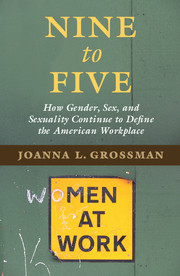Book contents
- Frontmatter
- Dedication
- Contents
- Foreword
- Acknowledgments
- Introduction
- PART I WHAT IS SEX DISCRIMINATION?
- PART II SEXUAL HARASSMENT
- PART III PREGNANT WOMEN AND MOTHERS AT WORK
- PART IV FEMALE BREADWINNERS AND THE GLASS CEILING
- 47 The Supreme Court Slams the Door on Pay Discrimination Claims
- 48 A Call for Congressional Action to Remedy Pay Inequality
- 49 The Lilly Ledbetter Fair Pay Act of 2009
- 50 Taking Stock: Is the Ledbetter Act Working?
- 51 The Lady in Red
- 52 Unfinished Business
- 53 Will ABA's Proposed Solutions for Gender Inequity Work?
- 54 Equality Still Elusive for Women in the Federal Workforce
- 55 “Girlie Men”
- 56 Playing “Too Womany” and the Problem of Masculinity in Sport
- 57 Binders for Women, Blinders for Romney
- Conclusion
- Notes
- Index
53 - Will ABA's Proposed Solutions for Gender Inequity Work?
from PART IV - FEMALE BREADWINNERS AND THE GLASS CEILING
Published online by Cambridge University Press: 05 May 2016
- Frontmatter
- Dedication
- Contents
- Foreword
- Acknowledgments
- Introduction
- PART I WHAT IS SEX DISCRIMINATION?
- PART II SEXUAL HARASSMENT
- PART III PREGNANT WOMEN AND MOTHERS AT WORK
- PART IV FEMALE BREADWINNERS AND THE GLASS CEILING
- 47 The Supreme Court Slams the Door on Pay Discrimination Claims
- 48 A Call for Congressional Action to Remedy Pay Inequality
- 49 The Lilly Ledbetter Fair Pay Act of 2009
- 50 Taking Stock: Is the Ledbetter Act Working?
- 51 The Lady in Red
- 52 Unfinished Business
- 53 Will ABA's Proposed Solutions for Gender Inequity Work?
- 54 Equality Still Elusive for Women in the Federal Workforce
- 55 “Girlie Men”
- 56 Playing “Too Womany” and the Problem of Masculinity in Sport
- 57 Binders for Women, Blinders for Romney
- Conclusion
- Notes
- Index
Summary
In 2001, the ABA's Commission on Women in the Profession issued its third report on the status of women lawyers, “The Unfinished Agenda: Women and the Legal Profession.” The commission identifies significant obstacles to the success of women lawyers and makes suggestions for eliminating them.
The ABA report delivers a timely and important message – that equality continues to elude women lawyers. It concludes that while women lawyers continue to be undercompensated, undervalued, sexually harassed, and victimized by discrimination and bias, the overarching perception is nevertheless that they have attained full equality.
The report makes useful suggestions for future research, which may be helpful in developing future ways women can overcome the profession's obstacles. But, unfortunately, some of the report's current proposals for changing the profession do not account for legal disincentives and cultural barriers that make them unlikely to work when applied in the real world.
OBSTACLE #1: MYTHS ABOUT MERITOCRACY
To begin, the report should be lauded for suggesting research that may debunk the myth that equality has already been achieved, and that the legal profession is already fully meritocratic. Despite hard evidence of persistent and entrenched gender inequality in the legal profession, many fail to see it. This barrier, which Professor Deborah Rhode has identified elsewhere as the “‘No Problem’ Problem,” is perhaps the most insidious. The failure to perceive inequality leads to complacency about gender issues and a corresponding failure to invoke problem-solving mechanisms. To combat these misperceptions, the ABA report encourages better and more systematic assessment of gender inequality problems.
Among the type of assessment suggested are surveys designed to assess the experience of women lawyers with respect to a variety of benchmarks (compensation, promotion, leadership, work structure, and satisfaction). The push for surveys makes sense. Surveys and studies can aggregate and publicize the individual, private experiences of women – and that, in turn, can convince lawyers, judges, and the public that there is a problem to be reckoned with. For example, surveys about sexual harassment in employment and education – conducted long before “sexual harassment” became a household phrase – certainly had this effect. (See the discussion in the introduction to Part III of this volume.)
OBSTACLE #2: GENDER STEREOTYPES
Another important barrier to women's equality arises from persistent gender stereotypes. This barrier, which is certainly not unique to the legal profession, takes several forms according to the ABA report.
- Type
- Chapter
- Information
- Nine to FiveHow Gender, Sex, and Sexuality Continue to Define the American Workplace, pp. 309 - 313Publisher: Cambridge University PressPrint publication year: 2016
- 1
- Cited by



